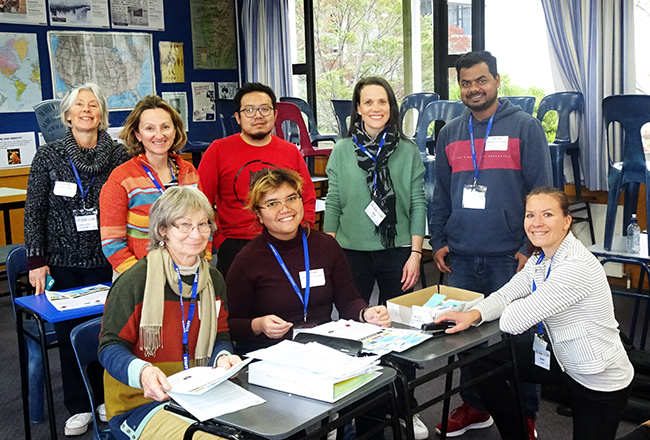Friday 9 July 2021 5:36pm

Several members of the BEATS-2 Study data collection team (Front, from left): Ann-Maree Fox, Margaretha Situmorang (PhD candidate), Kaisa Kentala (all research assistants). Back row (from left): Charlotte Flaherty (research assistant), Adjunct Professor Sandra Mandic (principal investigator), Long Chen (PhD candidate), Kim King (project manager), Mohammad Lutfur Rahman (PhD candidate)
On July 13 University of Otago Centre for Sustainability research affiliate Sandra Mandic will present the latest findings from a large-scale, eight-year transport research on how pupils get to school across Otago.
Using data from the Built Environment and Active Transport to School (BEATS) Research Programme, Professor Mandic will outline how walking and cycling for transport are associated with multiple health and environmental benefits for Otago’s secondary school pupils.
The group will share the latest findings related to transport to school patterns across urban and rural settings in Otago, current PhD research projects, and a progress on the current BEATS Natural Experiment study in Dunedin.
“Recent BEATS findings suggest the need for reducing the car travel in Dunedin. In Dunedin, one out of ten private vehicle trips during the school pick up and drop off times are due driving adolescents to and from school. Dunedin adolescents have sustained interest in car-based travel and have reported multiple barriers for using public bus transport to school. School principals were aware of main barriers for walking and cycling to school and viewed school travel as a family decision and choice,” Mandic says.
The original BEATS Study, conducted from 2014 to 2017, collected data from 1780 adolescents from all 12 Dunedin high schools (and data from 355 parents 14 teachers and 12 principals.) This, and subsequent BEATS Research projects, has since published a number of findings, among which are; less than half of Otago adolescents meet physical activity guidelines; that nearly half of adolescents using active transport to school (alone or in combination with motorised modes) met physical activity recommendations (compared to only one third of motorised transport users).
Adolescents enrolled at their closest high school in Dunedin had five times higher rates of active transport and lower rates of motorised transport use to school compared to those who enrolled at a distant school.
Comparisons between rural and urban settings showed that overall, adolescents are less physically active on weekends compared to school days; adolescents from large urban areas spent more time being stationary compared to their rural peers.
Furthermore, BEATS findings showed adolescents and their parents favoured walking compared to cycling as a mode of transport to school; cycling to school among Dunedin adolescents was less common and perceived as less safe, and that cycling also received less social and infrastructure support. The perceptions of both walking and cycling to school differed by how far adolescents lived from their school.
“Taken together, BEATS findings emphasise the importance of having schools, adolescents, parents and government authorities working together on reducing car travel to school and encouraging adolescents to walk, cycle and use public transport for school journeys”.
Professor Mandic will be joined by BEATS Research Team members Kim King, Kaisa Kentala and PhD students Mohammad Lutfur Rahman and Margaretha Situmorang.
The BEATS programme examines individual, social, environmental and policy influences on walking and cycling to school in Otago adolescents. The latest BEATS report, released on April 2021, is available here.
About the speaker: BEATS Principal investigator Sandra Mandic, PhD, is Adjunct Professor at Auckland University of Technology, Research Affiliate of the Centre for Sustainability at the University of Otago, and the Director of AGILE Research Limited.
When: Tuesday July 13, 2021, 12 – 1pm
Where: Centre for Sustainability Seminar Room, 563 Castle Street.
